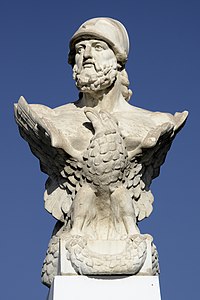User:Iphigenia in Tauris/Elpinice
| This is the sandbox page where you will draft your initial Wikipedia contribution.
If you're starting a new article, you can develop it here until it's ready to go live. If you're working on improvements to an existing article, copy only one section at a time of the article to this sandbox to work on, and be sure to use an edit summary linking to the article you copied from. Do not copy over the entire article. You can find additional instructions here. Remember to save your work regularly using the "Publish page" button. (It just means 'save'; it will still be in the sandbox.) You can add bold formatting to your additions to differentiate them from existing content. |
Article Draft
[edit]*** Having some formatting issues, especially with the citations/references page, trying to get them to update with the rest of the article quotations and citations. Also, attempting to add a little bit more information to the romantic affiliation section.
edited from: Elpinice
From Wikipedia, the free encyclopedia
For the daughter of Herodes Atticus, see Elpinice (daughter of Herodes Atticus).
Elpinice (Greek: Ελπινίκη Elpiniki, meaning: 'hope of victory' [1] flourished c. 450 BC ancient Greece) was a noblewoman of classical Athens. Part of the Cimonids (related to Cimon), her high status in society through birth and marriage influenced her outspoken nature as seen in Plutarch's works.

Family
[edit]edited from: Elpinice
She was the daughter of Miltiades, tyrant of the Greek colonies on the Thracian Chersonese and Hegesipyle, daughter of King Olorus of Thrace. She was the sister of Cimon, an important Athenian political figure, and half-sister of Metiochus (eldest son of Miltiades, from a prior marriage). She is known from Plutarch's life of Pericles, where she appears twice in political confrontations with the Athenian statesman. Herodes Atticus claimed his lineage from Miltiades from Elpinice, and named his daughter after her. [1] At her death she was buried with members of her own family by birth and not her husbands, showing her piety towards her blood family. This suggests a continuing closeness and loyalty with her brother.
Marriage and Romantic Affiliations
[edit]edited from: Elpinice
Greek law allowed marriage between a brother and sister if they had different mothers. Some accounts[2]say that Elpinice was for a time married to her brother, but was later given as a bride to Callias II, one of the richest men in Athens, who had fallen in love with her. Rumors of incestuous conduct between Cimon and Elpinice were prominent enough that archaeologists have found ostracons reflecting the rumors.[1] It is possible that[1] Callias had made marriage to Elpinice the condition for paying, on Cimon's behalf, the fine which had been imposed upon their father Miltiades and for which Cimon had inherited responsibility.


She was a lover to the artist Polygnotus of Thasos who used her features in his work depicting the Trojan woman Laodice.
Political and Military Associations
[edit]Miltiades was one of the major forces securing a victory in the Battle at Marathon during the Greco-Persian Wars. Elpinice, at the time, was still a child and not of age. She would have left Athens during the battle.[1]
edited from: Elpinice
When Cimon was charged with treason for taking bribes from Alexander I, king of Macedonia, she negotiated his acquittal with Pericles.

When the people of the island of Samos revolted against Athenian rule, Pericles pursued a war against them and punished them by demolishing their city walls, confiscating their ships and forcing them to pay a large fine. Rather than celebrate the victory Elpinice was a lone voice who pointed out that it was won over Athens' own people rather that against her true foreign enemies such as the Phoenicians or Medes. Pericles rebuked her with the words "As an old woman you should not anoint yourself with oils." This dismissed the seriousness of her charge and at the same time implied women's only power lay in their sexuality. Which shows Pericles' views on women in Athenian political society, and how Elpinice might have been viewed by the men in the public sphere. Elpinice was one of the few women in antiquity that is shown to speak in public.
- ^ a b c d e Nevin, Sonya (2022). The Idea of Marathon. Bloomsbury Academic. ISBN 978-1-350-15762-0.
- ^ Evelyn-White, Hugh G. (1914). "Plutarch's Lives - Plutarch's Lives, with an English Translation by Bernadotte Perrin, in ten volumes. Vol. I.: Pp. xix + 582; Vol. II.: Pp. ix + 631. Small 8vo. London: William Heinemann. New York: The Macmillan Company, 1914". The Classical Review. 30 (3): 89–90. doi:10.1017/s0009840x00010118. ISSN 0009-840X.
